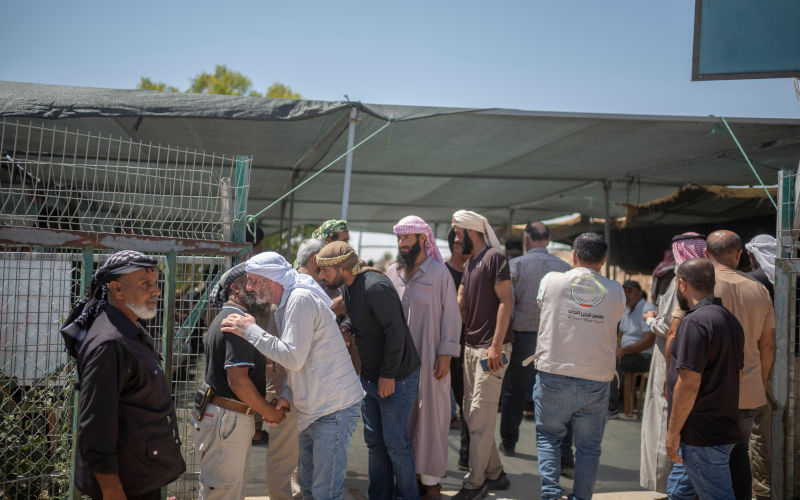A violent Israeli settler and his Palestinian victim – only one is welcome in Trump's America
July 31, 2025
Relentless Israeli oppression and dismissive American policy embolden settlers and further degrade Palestinian life. As a friend of Palestinian teacher and human rights activist Adwah Hathaleen said of his killing, ‘This is how Israel erases us – one life at a time."
On Monday, in the West Bank village of Umm al-Kheir, an all too familiar pattern played out. Israeli settlers entered onto private Palestinian land with a bulldozer. Yinon Levi — a settler from the nearby extremist outpost of Meitarim — opened fire with his handgun. A bullet hit Awdah Hathaleen, a local teacher and human rights activist. He later died of his wounds.
Levi was arrested, but has since been released to house arrest – despite the shooting being caught on video.
This tragic and criminal story captures — at its most horrific — the tightening vice Palestinians live under, shaped by forces far beyond their villages, not just in Israel, but also in the US.
Last year, a number of countries — including the US, Canada, and the UK — imposed sanctions on Levi for his central role in a campaign of settler violence and forced displacement.
“Levi consistently leads a group of settlers who assault Palestinians, set fire to their fields, destroy their property, and threaten to harm them again if they do not leave their homes,” read the statement from then-president Biden’s State Department.
But the designation was short-lived. A short time after taking office, President Donald Trump lifted the sanctions, along with restrictions on other violent settlers, realigning with a settler-friendly agenda spearheaded by evangelical US Ambassador Mike Huckabee.
But the Trump administration is not just connected to Hathaleen’s life and death in one way, but two.
In June, Hathaleen travelled to the US at the invitation of Jewish groups. He and another activist from Umm al-Kheir were part of an interfaith program sponsored by Kehilla Community Synagogue in Piedmont, California.
Hathaleen, who had collaborated on the Oscar-winning documentary No Other Land, was scheduled to speak about the expulsion his community was undergoing. But when the two arrived at San Francisco airport, they were detained for hours and denied entry without explanation – despite having visas sponsored by the Jewish community.
Palestinian lives aren’t only devalued in Gaza, where mass death unfolds in real time, but also in the West Bank, where daily expulsions and violence are treated as background noise – enabled by US policies that back Israeli control of the West Bank, reject Palestinian statehood and expand support for settlements.
Relentless Israeli oppression and dismissive American policy embolden the settler right and further degrade Palestinian life. As No Other Land director Basel Adra wrote about his friend on X, “This is how Israel erases us – one life at a time.”
Hathaleen was 31 when he was killed. He first saw the ocean at 23, a dream he’d carried since he was a child. He leaves behind three children. He told friends he wanted to raise them elsewhere, somewhere safer. But he had nowhere to go. The doors of the world were shut to him.
His humiliating expulsion from the US — a result of Trump’s draconian policies targeting pro-Palestinian voices — preceded his return to a place where his killing felt all too predictable.
When an American-Palestinian was killed by settlers in the West Bank earlier this month, Huckabee called for an investigation. No such call came for Hathaleen. His is a life treated as disposable by the US, something which has echoes in the past. In 1940, Breckinridge Long, a powerful figure at the State Department and architect of the US visa lockdown of the time, wrote about Jews trying to flee Europe to America: “We cannot continue to let these tragic people go on hoping …”
With Hathaleen’s killing, another settler crime will go unpunished, and the basic desire of every oppressed person — to be allowed to hope — is buried again.
Republished from Haaretz Today, 29 July 2025
The views expressed in this article may or may not reflect those of Pearls and Irritations.

